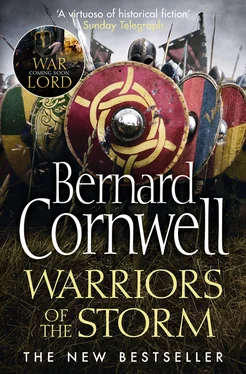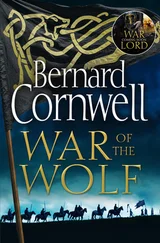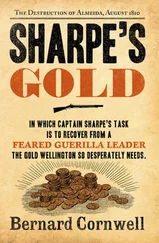1 ...7 8 9 11 12 13 ...17 Berg Skallagrimmrson was a Norseman who had sworn loyalty to me, a loyalty he had proven in the three years since I had saved his life on a beach in Wales. He could have ridden north any time to the kingdom of Northumbria and there found a Dane or a fellow Norseman who would welcome a young, strong warrior, but Berg had stayed true. He was a thin-faced, blue-eyed young man, serious and thoughtful. He wore his hair long in Norse fashion, and had persuaded Sihtric’s daughter to make a scribble on his left cheek with oak-gall ink and a needle. ‘What is it?’ I had asked him as the scars were still healing.
‘It’s a wolf’s head, lord!’ he had said, sounding indignant. The wolf’s head was my symbol and the inked device was his way of showing loyalty, but even when it healed it looked more like a smeared pig’s head.
Now the two of us rode eastwards. I still did not fear any enemy war-band because I had a suspicion of what Ragnall really wanted, and it was that suspicion that kept us riding into the afternoon, by which time we had turned north and were following a Roman road that led to Northumbria. We were still well to the east of Eads Byrig, but as the afternoon waned we climbed a low hill and I saw where a bridge carried the road across the river, and there, clustered close to two cottages that had been built on the Mærse’s north bank, were men in mail. Men with spears. ‘How many?’ I asked Berg, whose eyes were younger than mine.
‘At least forty, lord.’
‘He doesn’t want us to cross the river, does he?’ I suggested. ‘Which means we need to get across.’
We rode east for an hour, keeping a cautious eye for enemies, and at dusk we turned north and came to where the Mærse slid slow between pastureland. ‘Can your horse swim?’ I asked Berg.
‘We’ll find out, lord.’
The river was wide here, at least fifty paces, and its banks were earthen bluffs. The water was murky, but I sensed it was deep and so, rather than risk swimming the beasts over, we turned back upstream until we discovered a place where a muddy track led into the river from the south and another climbed the northern bank, suggesting this was a ford. It was certainly no major crossing place, but rather a spot where some farmer had discovered he could cross with his cattle, but I suspected the river was usually lower. Rain had swollen it.
‘We have to cross,’ I said, and spurred my horse into the water. The river came up to my boots, then above them, and I could feel the horse struggling against the current. He slipped once, and I lurched sideways, thought I must be thrown into the water, but somehow the stallion found his footing and surged ahead, driven more by fear than by my urging. Berg came behind and kicked his horse faster so that he passed me and left the river before I did, his horse flailing up the far bank in a flurry of water and mud.
‘I hate crossing rivers,’ I growled as I joined him.
We found a spinney of ash trees a mile beyond the river and we spent the night there, the horses tethered while we tried to sleep. Berg, being young, slept like the dead, but I was awake much of the night, listening to the wind in the leaves. I had not dared light a fire. This land, like the country south of the Mærse, appeared deserted, but that did not mean no enemy was near, and so I shivered through the darkness. I slept fitfully as the dawn approached, waking to see Berg carefully cutting a lump of bread into two pieces. ‘For you, lord,’ he said, holding out the larger piece.
I took the smaller, then stood, aching in every bone. I walked to the edge of the trees and gazed out at greyness. Grey sky, grey land, grey mist. It was the wolf-light of dawn. I heard Berg moving behind me. ‘Shall I saddle the horses, lord?’ he asked.
‘Not yet.’
He came and stood beside me. ‘Where are we, lord?’
‘Northumbria,’ I said. ‘Everything north of the Mærse is Northumbria.’
‘Your country, lord.’
‘My country,’ I agreed. I was born in Northumbria and I hope to die in Northumbria, though my birth had been on the eastern coast, far from these mist-shrouded fields by the Mærse. My land is Bebbanburg, the fortress by the sea, which had been treacherously stolen by my uncle and, though he was long dead, the great stronghold was still held by his son. One day, I promised myself, I would slaughter my cousin and take back my birthright. It was a promise I made every day of my life.
Berg gazed into the grey dampness. ‘Who rules here?’ he asked.
I half smiled at the question. ‘Tell me,’ I said, ‘have you heard of Sygfrothyr?’
‘No, lord.’
‘Knut Onehand?’
‘No, lord.’
‘Halfdan Othirson?’
‘No, lord.’
‘Eowels the Strong?’
‘No, lord.’
‘Eowels wasn’t that strong,’ I said wryly, ‘because he was killed by Ingver Brightsword. Have you heard of Ingver?’
‘No, lord.’
‘Sygfrothyr, Knut, Halfdan, Eowels, and Ingver,’ I repeated the names, ‘and in the last ten years each of those men has called himself King of Jorvik. And only one of them, Ingver, is alive today. You know where Jorvik is?’
‘To the north, lord. A city.’
‘It was a great city once,’ I said bleakly. ‘The Romans made it.’
‘Like Ceaster, lord?’ he asked earnestly. Berg knew little of Britain. He had served Rognvald, a Norseman who had died in a welter of bloodshed on a Welsh beach. Since then Berg had served me, living in Ceaster and fighting the cattle-raiders who came from Northumbria or the Welsh kingdoms. He was eager to learn though.
‘Jorvik is like Ceaster,’ I said, ‘and like Ceaster its strength lies in its walls. It guards a river, but the man who rules in Jorvik can claim to rule Northumbria. Ingver Brightsword is King of Jorvik, but he calls himself King of Northumbria.’
‘And is he?’
‘He pretends he is,’ I said, ‘but in truth he’s just a chieftain in Jorvik. But no one else can call himself King of Northumbria unless he holds Jorvik.’
‘But it’s not strong?’ Berg asked.
‘Eoferwic’s walls are strong,’ I said, using the Saxon name for Jorvik, ‘they’re very strong! They’re formidable! My father died attacking those walls. And the city lies in rich country. The man who rules Eoferwic can be a gold-giver, he can buy men, he can give estates, he can breed horses, he can command an army.’
‘And this is what King Ingver does?’
‘Ingver couldn’t command a dog to piss,’ I sneered. ‘He has maybe two hundred warriors. And outside the walls? He has nothing. Other men rule beyond the walls, and one day one of those men will kill Ingver as Ingver killed Eowels, and the new man will call himself king. Sygfrothyr, Knut, Halfdan, and Eowels, they all called themselves King of Northumbria and they were all killed by a rival. Northumbria isn’t a kingdom, it’s a pit of rats and terriers.’
‘Like Ireland,’ Berg said.
‘Like Ireland?’
‘A country of little kings,’ he said. He frowned for a moment. ‘Sometimes one calls himself the High King? And maybe he is, but there are still many little kings, and they squabble like dogs, and you think such dogs will be easy to kill, but when you attack them? They come together.’
‘There’s no high king in Northumbria,’ I said, ‘not yet.’
‘There will be?’
‘Ragnall,’ I said.
‘Ah!’ he said, understanding. ‘And one day we must take this land?’
‘One day,’ I said, and I wanted that day to be soon, but Æthelflaed, who ruled Mercia, insisted that first we drive the Danes from her country. She wanted to restore the ancient frontier of Mercia, and only then lead an army into Northumbria, and even then she would not invade unless she had her brother’s blessing, but now Ragnall had come and threatened to make the conquest of the north even more difficult.
Читать дальше












